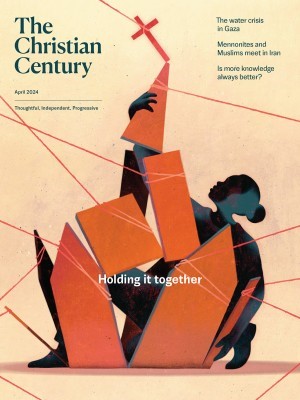When my spouse’s church became more affirming, the major givers left.
by Brian Bantum in the April 2024 issue of The Christian Century
Published on March 15, 2024
Article and links provided by Dave Edwards (GVIN) with notation: Both are highly relevant to current issues that we all face: One is the Israel/Gaza conflict; the other is on the topic of making our congregations more inclusive while retaining our vigor and our membership.

Century illustration (Source images: Getty)
I have been a Christian for over 30 years. Most days I still feel a lot like that skinny 15-year-old who was lost in the world only to be found by God, by a people. And though that feeling of a thin veil between me and the world still seems to slip up and down, I left that Southern Baptist Church and its theology a long time ago.
There was no singular trauma or betrayal that led me away from the evangelical nest. Instead it was all the small ways I tried to bring the rest of me and my world into the sanctuary with me—and the ways I saw beautiful people cut out or ignored. I began to see histories and varieties of faithfulness. There was so much of God’s difference in the world that seemed to be held at bay in the theology of my youth. That theology swaddled us in certainty, hope, and a sense of purpose—and as it held me in, it also kept much out.
And the more I saw God in the world, the fewer places I found to worship or serve, to be. I know I’m not alone. The more expansively we see our God, the harder it seems to find communities that share those convictions, and the harder it seems to sustain them when we do find them.

When my spouse was beginning to lead our church toward full affirmation and inclusion, one worry was about who would leave. Would there be enough financial support? From talking to colleagues and hearing the stories of other pastors and communities, I know this fear is not unfounded. I have known few churches that grew when they became affirming or whose giving increased when they centered a gospel of justice and mercy.
I realize that this may be fear and a lament that is US-centric. Christianity is growing throughout the world, and those expressions of faith are varied. Maybe the shrinking of the church in the US is more about a strange alchemy of privilege and individualism. But I wonder if there is something else happening amid these shifts and changes. While evidence of philanthropic giving is difficult to track, there are a number of interesting studies that suggest conservatives tend to give more to religious institutions than progressives do, while progressives tend to give more to other organizations and specific causes.
For communities that become affirming, for example, money questions are always looming. This was no different in my spouse’s community. The church was fortunate because only a small portion of the congregation left in the midst of the shift. But among that number were most of the major givers. While there are undoubtedly numerous factors that go into anyone’s decision to leave a congregation, there is also a certain pattern: when there is a turn to a more expansive vision, the money seems to drift away.
I wonder how much this has to do with the way the Christian story functions. For a long time in Christian history, the story was rather straightforward, with communities and denominations congregating around a particular way of telling that story, statements of faith or doctrines or implicit beliefs all pulled together tightly. What it meant to be inside or outside this community was a clearly drawn line. The stakes were clear, too; often heaven or hell, faithfulness or unfaithfulness. And with this clarity comes financial giving, the giving of time, the support of this institution that signified the mission and the story.
The reality of our lives, the differences inherent in our world and among one another, and the complications of histories are like water: always finding the smallest of gaps until the veneer pulls off and the story doesn’t seem to cover as much as it used to.
In the face of this, people leave or give up on the places where these stories were told. Their lives get busy, they may find that having two or three people who help them make sense of the world feels like enough, or they may even find little enclaves where people seem more accepting or authentic than any they found in their churches.
In some places there are little harbors, spaces that welcome the questions and the pain and even the cynicism, that welcome the spiritual refugees and exiles and widows. These are beautiful spaces where we see people slowly knit back together, where they find fellow sojourners. But these bodies can’t be built with the same certainty, the same mechanisms of missional purpose or obedience or guilt and shame. It’s harder for them to rely on a shared culture or common songs. The community is a community of difference, held together by a shared hope but also with gaps and space between those beliefs to allow others in.
While we see a waning of Christian life in some parts of the world and expansion in others, I wonder if we might ask if the inclusive church can ever really be a large church. Will the money follow these little indie communities, trying to stitch together spaces for the refugees and hold the difference and the questions and the nuance and the contradictions? Can the rhythms of volunteer efforts sustain the cycles of weekly programming that mark so much of our church life?
I suppose the question will also come back to all of us who call ourselves Christian and believe in these communities. What will it mean for us to sustain them in our work and in our giving? Creating space always has to be about more than slogans. It’s a question not just for US churches but for any Christian community that begins to wrestle with the difference in its midst.
The Christian Century‘s community engagement editor Jon Mathieu speaks with Brian Bantum about his article.
This column appears in the April 2024 issue.

Brian Bantum
Brian Bantum is professor of theology at Garrett-Evangelical Theological Seminary and author of Redeeming Mulatto and The Death of Race.